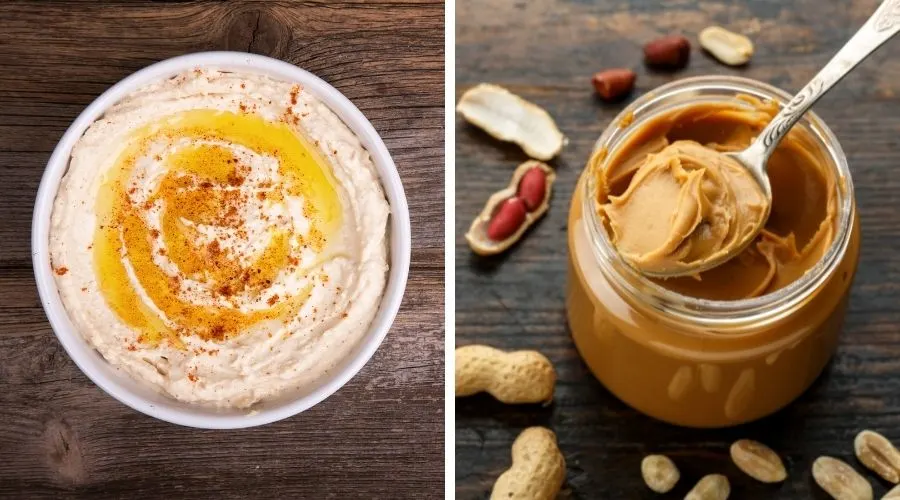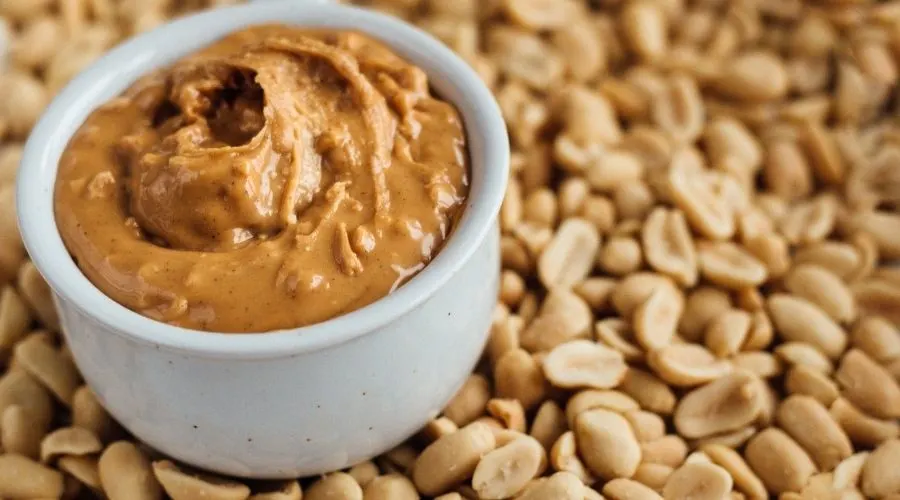Hummus (or houmous, depending on how you want to spell it) are both highly popular snack and dip options that are both known for certain health benefits, but is one better than the other?
In this article, I’ll be comparing hummus and peanut butter head-to-head in various categories, including ingredients, calories, and nutrients to find out which is the best in each category.
Read on to find out more and tell us which is your favorite when it comes to flavor and texture by voting in our poll.
Also in This Article
In a hurry, or looking for something specific? Use the links below to jump to the relevant section:
Ingredients Comparision
The chart below shows the typical ingredients of hummus and peanut butter that you can buy in grocery stores.
As you can see, the ingredients for each product are pretty different, with hummus being made mostly from chickpeas, water, and tahini (ground sesame seeds) compared to peanut butter which is mostly made from peanuts and sugar.
Hummus and peanut butter contain added vegetable oils, which vary between brands, and added salt.
It’s worth pointing out that these ingredients are typical of best-selling brands, but you can get natural peanut butter without sugar or reduced salt options.
| Typical Hummus Ingredients | Typical Peanut Butter Ingredients |
| Cooked Chickpeas, Water, Tahini (Ground Sesame), Oil, Garlic, Salt, Citric Acid & preservatives. | Roasted Peanuts, Sugar, Vegetable Oils, preservatives, Salt. |

Hummus Vs. Peanut Butter Nutritional Comparison
Moving onto the nutritional comparison and this will be based on official data, which is available in the USDA FoodData Central (source links are at the bottom of this page).
I’m using data for generic hummus, and peanut butter types, and the comparison is weight-for-weight per 100g of product.
Please note that many other brands are available, and nutritional information will vary between each one depending on the ingredients.
Calorie Comparison
The calorie content of hummus and peanut butter are pretty different, with peanut butter containing over double the calories of hummus per weight.
To put this into context, a smaller 15g serving (around one tablespoon) of peanut butter contains 96kcal compared to hummus which contains 36kcal.
Based on this information, if calories counting is a consideration for your diet, hummus is a lower calorie option compared to peanut butter.
| Food Type | Calories Per 100g |
| Hummus (Houmous) | 243kcal |
| Peanut Butter | 639kcal |
Carbohydrates, Sugars & Fiber
If carbohydrates are an important factor in your diet, hummus is the lowest carb option of the two; it’s much lower in sugars and slightly higher in dietary fiber.
The peanut butter I compared has added sugar, but you can buy lower sugar options which in turn are lower in carbs, so it’s worth checking the label before you buy.
| Nutrient Type | Hummus – amount per 100g | Peanut Butter – amount per 100g |
| Carbohydrates | 14.9g | 22.3g |
| Of Which Are Sugars | 0.34g | 10.5g |
| Dietary Fiber | 5.4g | 4.8g |
Fat Comparison
Hummus and peanut butter are both high in fat due to the natural fats found in the ingredients and the added oil. The kinds of fat and oil which are used in hummus vary between brands, but it’s typically soybean or palm oil.
Compared to hummus, peanut butter is the highest in fat, with 51.1g per 100g, compared to hummus which contains 17.1g. Peanut butter is also higher in saturated fat compared to hummus, and both also contain ‘good fats’ that are found in vegetable oils.
If you’re looking to reduce the amount of fat you eat, then hummus is a better option compared to peanut butter, although hummus is fairly high in fat too.
| Fat Type | Hummus – amount per 100g | Peanut Butter – amount per 100g |
| Total Fat | 17.1g | 51.1g |
| Saturated Fat | 2.22g | 10.1g |
| Monounsaturated Fat | 6.37g | 25.4g |
| Polyunsaturated Fat | 7.48g | 12.3g |
| Trans Fat | 0.018g | 0.06g |
Protein Comparison
Many people choose peanut butter as a snack because of the protein content, and when compared to hummus, it contains around three times the amount of protein per weight.
Per 15g (tablespoon) of product, hummus contains 1.1g of protein, whereas peanut butter contains 3.4g.
| Food Type | Protein amount per 100g |
| Hummus (Houmous) | 7.35g |
| Peanut Butter | 22.5g |
Vitamins & Minerals Comparison
Because they’re made from a variety of natural ingredients, hummus and peanut butter both contain a range of vitamins and minerals at varying levels.
When comparing the two, peanut butter contains higher levels of vitamins and minerals in more micronutrient categories than hummus.
The table below shows the amount of vitamins and minerals in each product side-by-side so you can compare the two:
| Vitamin/Mineral Type | Hummus – Amount Per 100g | Peanut Butter – Amount Per 100g |
| Sodium | 438mg | 429mg |
| Vitamin D | – | – |
| Calcium | 41mg | 49mg |
| Iron | 2.41mg | 1.73mg |
| Phosphorus | 166mg | 339mg |
| Potassium | 289mg | 564mg |
| Magnesium | 71.1mg | 169mg |
| Thiamin | 0.15mg | 0.138mg |
| Riboflavin | 0.115mg | 0.191mg |
| Vitamin B6 | 0.143mg | 0.444mg |
| Vitamin C | – | – |
| Vitamin A | 1mcg | – |
| Vitamin E | 1.74mg | 9.11mg |
| Niacin | 0.948mg | 13.3mg |
| Folate | 36mcg | 86mcg |
| Zinc | 1.38mg | 2.54mg |
*mcg = microgram (1000th of a milligram) / mg = milligram (1000th of a gram)

Best for Flavor/Texture
When it comes to flavor and texture, it’s not easy to judge a winner because it’s down to the individual which they prefer.
Hummus and peanut butter have very different textures and flavors, with hummus being more savory than peanut butter which is a sweeter option.
To get a range of opinions, we’re taking a poll to find out whether Hummus or Peanut Butter is the public favorite.
Submit your vote below (no personal information required) to find out which is the favorite so far.
Summary
We’ve now compared all nutritional categories, and I can reveal the winner of the most categories in nutrition between hummus and peanut butter is – hummus.
Hummus came out as the lowest in calories, carbs, sugar, and fat while being slightly higher in fiber. In contrast, peanut butter came out best for protein, sodium, vitamins, and minerals.
Ultimately, it all comes down to what is most important to you and your diet, and hopefully, the data in this article can help you to decide.
If sugar or carbs are a big consideration for you and you’re a peanut butter fan, then it’s worth shopping around for low sugar alternatives because there are lots of choices out there.
| Comparison Category | Winner (Hummus or Peanut Butter) |
| Best for Calorie Content | Hummus |
| Best for Carbohydrate Content | Hummus |
| Best for Sugar Content | Hummus |
| Best for Protein Content | Peanut Butter |
| Best for Fat Content | Hummus |
| Best for Fiber Content | Hummus |
| Best for Sodium Content | Peanut Butter |
| Best for Vitamins/Minerals | Peanut Butter |
| Overall Winner | Hummus |
More Hummus Vs. Peanut Butter FAQs
You can substitute peanut butter for hummus, but it might not work so well in situations where you need sweetness because hummus is a savory option. Hummus makes a great dip for chips or veggies and goes really well with bread too.
Peanut butter is higher in more vitamins and minerals and protein when compared to hummus, but it’s also much higher in fat, carbs, and sugar (although low sugar options are available).
Related Articles
I hope this article has helped you to find the information you were looking for; you might also find the following articles helpful too:
Nutella Vs. Peanut Butter (Which is Better?)
Ranch Vs. Mayo (What’s the Difference?)
Cheerios vs Shredded Wheat (Which One Should You Get)
References Used for this Article
To ensure the nutritional information used in this article is accurate, I have used data from the USDA FoodData Central Search; the links below contain the source information:
